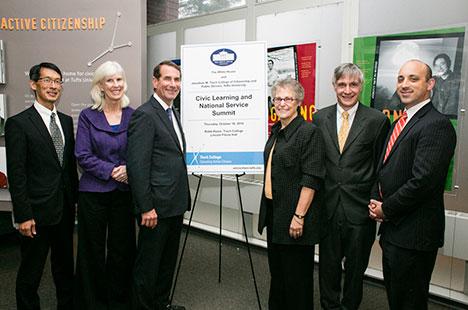Tisch College Leads National Effort to Revitalize Democracy and Higher Education

Higher education is at a crossroads. Colleges and universities have built impressive programs and initiatives for civic engagement, but these efforts still fail to reach most students or serve most communities.
Many in higher education are acutely aware of this challenge, and Tisch College is collaborating with the White House and others in the field to identify solutions.
Today, Tisch College released proceedings from the Summit on Civic Learning and National Service which it hosted in partnership with the White House and the U.S. Department of Education in October 2014.
This invitational Summit brought together 75 higher education leaders, government officials, representatives of civic organizations, and researchers studying civic learning and engagement. The rich conversation brought many themes and disagreements.
Tisch College Dean Alan D. Solomont offered opening remarks at the event. “I believe our nation stands at a critical moment when civic engagement is needed badly but is also sorely lacking,” he said. “Our democracy is ailing, and higher education, including this University, must do better, and we must do more.”
Among the attendees were Tufts alumnus Jonathan Greenblatt, Special Assistant to the President and Director of the White House Office of Social Innovation and Civic Participation; Jamienne Studley, Deputy Undersecretary at the Department of Education; and Carol Schneider, President of the Association of American Colleges and Universities.
The discussion was rich, impassioned, and productive. Certain major themes surfaced and appeared to attain consensus. For instance, many participants agreed that:
- Higher education has been resistant to political engagement and education for democracy;
- The public case for democratic education has been lost in the national debate about job readiness;
- Many excellent programs exist, but they are voluntary and small, not pervasive;
- Colleges are not assessing their own impact on democratic outcomes; and
- Civic and political engagement help low-income and historically underrepresented students succeed in college.
Given the wide variety of attendees, the large group, and the one-day nature of the Summit, participants could not generate a consensus on a full list of specific recommendations. Tisch College plans to build on this summit with further convenings, research, and resources for higher education.
“We see a pressing need to develop a proactive agenda for democracy and higher education,” said Peter Levine, Tisch College Associate Dean for Research. “The goal will be to influence state and federal policymakers and college and university leaders. The agenda must not shy away from measurement and accountability but should offer positive proposals for how to assess and reward civic outcomes.”
For example, Tisch College’s National Study on Learning, Voting, and Engagement (NSLVE) offers participating campuses accurate voting data on their own students as one component of a civic assessment system.
“Educating for democracy is quite different from encouraging civic participation,” said Nancy Thomas, who oversees the NSLVE study. “Americans need to know not just how governments function. They need a deep understanding of their shared responsibility – for each other, their communities, and the nation – as well as the skills to tackle society’s most pressing public challenges. While educating for democracy is indisputably political, it need not be partisan with one exception: we should all be ‘for’ democratic principles and practice.”